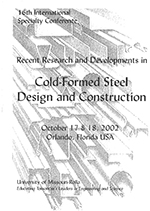Session Dates
17 Oct 2002
Abstract
Details of a dual-actuator rig developed for testing rectangular plates simply supported on three sides, with the remaining (longitudinal) edge free, under combined uni-axial compression and in-plane bending are presented. Particular attention is given to ensuring a constant strain eccentricity to the loaded ends, as opposed to a constant load eccentricity, in order to determine the post-buckling behavior and ultimate load and moment capacities of unstiffened thin-walled elements. Strain gradients varying from pure compression to pure bending are facilitated. The plate test results are presented in the form of strength curves, and are used to establish effective width equations for the strain gradients tested. The applicability of using elastic or plastic effective widths for unstiffened elements under strain gradients is discussed.
Department(s)
Civil, Architectural and Environmental Engineering
Research Center/Lab(s)
Wei-Wen Yu Center for Cold-Formed Steel Structures
Meeting Name
16th International Specialty Conference on Cold-Formed Steel Structures
Publisher
University of Missouri--Rolla
Document Version
Final Version
Rights
© 2002 University of Missouri--Rolla, All rights reserved.
Document Type
Article - Conference proceedings
File Type
text
Language
English
Recommended Citation
Bambach, M. R. and Rasmussen, Kim J. R., "Effective Widths of Unstiffened Elements under Combined Compression and Bending" (2002). CCFSS Proceedings of International Specialty Conference on Cold-Formed Steel Structures (1971 - 2018). 2.
https://scholarsmine.mst.edu/isccss/16iccfss/16iccfss-session1/2
Effective Widths of Unstiffened Elements under Combined Compression and Bending
Details of a dual-actuator rig developed for testing rectangular plates simply supported on three sides, with the remaining (longitudinal) edge free, under combined uni-axial compression and in-plane bending are presented. Particular attention is given to ensuring a constant strain eccentricity to the loaded ends, as opposed to a constant load eccentricity, in order to determine the post-buckling behavior and ultimate load and moment capacities of unstiffened thin-walled elements. Strain gradients varying from pure compression to pure bending are facilitated. The plate test results are presented in the form of strength curves, and are used to establish effective width equations for the strain gradients tested. The applicability of using elastic or plastic effective widths for unstiffened elements under strain gradients is discussed.



